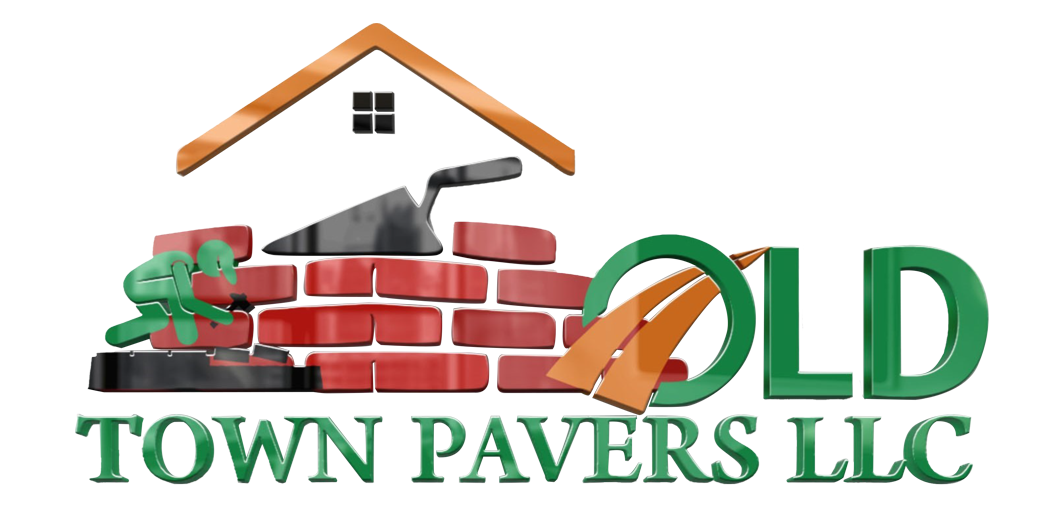Introduction to Permeable Pavers
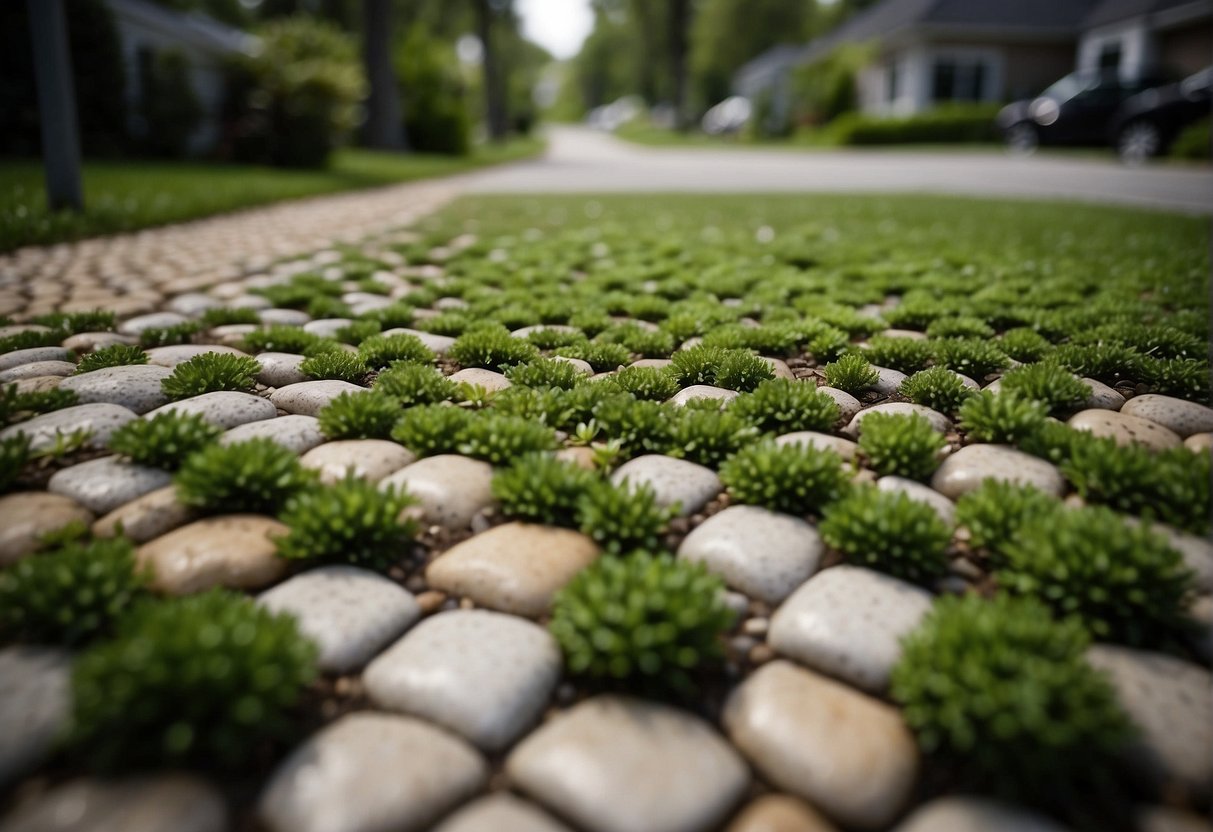
Permeable pavers are an innovative paving solution that help mitigate environmental concerns associated with impermeable surfaces like traditional asphalt. We explore their composition, benefits, and contrast them against conventional materials to understand their significance in urban infrastructure.
Defining Permeable Pavers
Permeable pavers are distinct construction blocks designed to allow water to pass through the surface, reducing runoff and promoting natural ground water recharge. Unlike dense asphalt and concrete, these pavers have gaps between them filled with small stones or grass, permitting water to filter down through multiple layers of aggregate material beneath.
Eco-Friendly Materials in Permeable Pavement
As advocates for green building materials, we champion eco-friendly materials such as recycled plastic, crushed stone, and porous concrete in the manufacture of permeable pavers. These materials prove elemental in curbing environmental impact, diminishing the heat island effect commonly perpetuated by asphalt, and supporting rainwater management in urban settings.
- Recycled Plastic: Utilizing post-consumer waste, reducing landfill deposits.
- Crushed Stone: A natural, abundant resource that offers high permeability.
- Porous Concrete: Concrete with voids that enable water percolation.
Contrast with Traditional Asphalt
| Feature | Permeable Pavers | Traditional Asphalt |
|---|---|---|
| Water Permeability | High | None |
| Heat Island Effect | Reduced | Amplified |
| Eco-Friendliness | High | Low |
| Maintenance | Low to moderate | High |
Asphalt is a pervasive, impermeable material that leads to water runoff and heat retention. We underline the stark difference between permeable pavers and traditional asphalt by pointing out the latter’s environmental shortcomings, including its higher maintenance needs and poor performance in promoting water conservation.
Environmental Benefits of Permeable Pavers
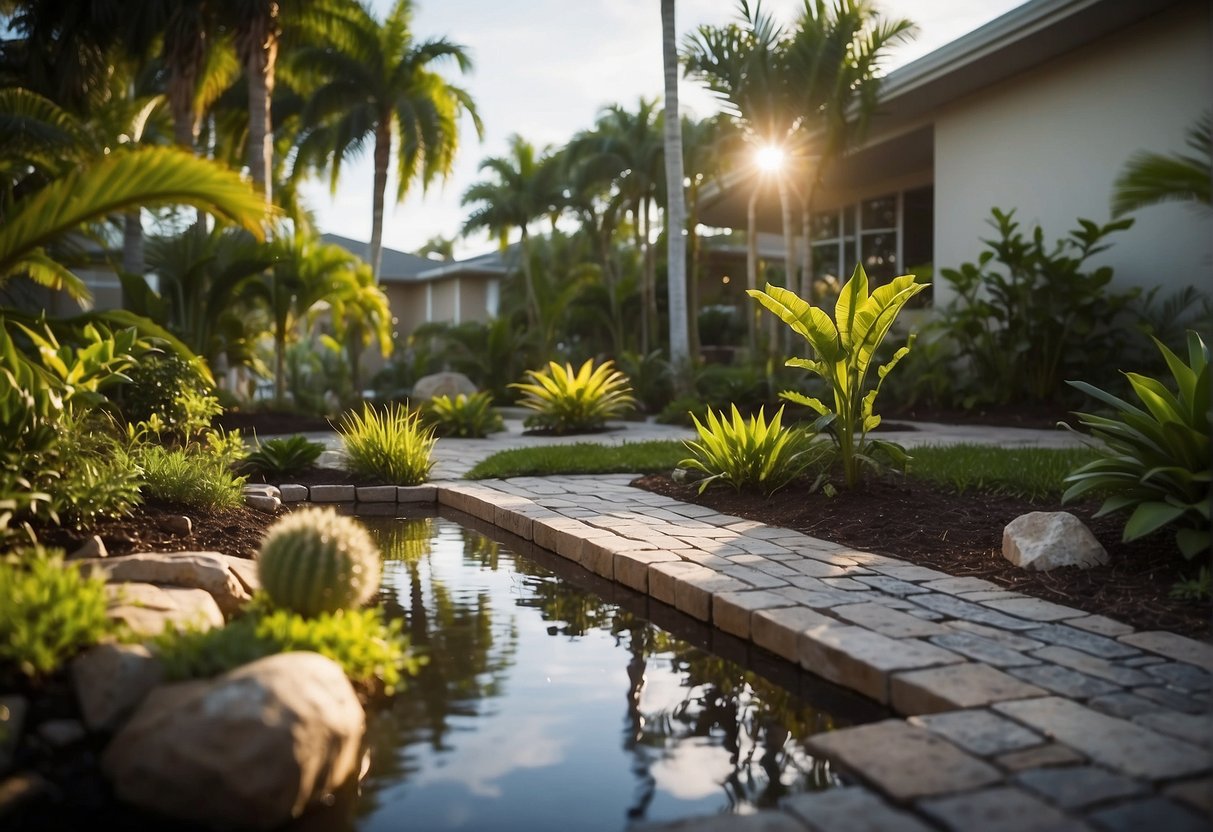
We find that permeable pavers offer significant environmental advantages that align with our commitments to eco-friendly practices. Their unique design addresses critical aspects of sustainable water and land management.
Water Management and Drainage
Permeable pavers allow water to pass through gaps or porous materials directly into the soil beneath. We see better water management as rainwater naturally filters through the pavement, reducing the burden on stormwater systems. This process mimics the natural water cycle, supporting the replenishment of groundwater.
- Improved drainage: Prevents water pooling and reduces slick surfaces.
- Eco-friendly: The system promotes natural water flow, which is less disruptive to the surrounding ecosystem.
Reduction in Water Runoff and Flooding
By facilitating the absorption of water, permeable pavers significantly cut down on the volume and speed of water runoff. This natural infiltration can curb the frequency and severity of flooding events.
- Reduction in runoff: Limits the swift flow of stormwater that can lead to erosion.
- Flooding prevention: Lessens the impact of heavy rainfall by allowing water to penetrate the ground.
Pollution and Erosion Control
We integrate permeable pavers as a means to capture pollutants that would otherwise enter waterways. Sediments and contaminants are trapped and broken down, which reduces the overall environmental impact.
- Traps pollutants: Aids in capturing oil, heavy metals, and other contaminants.
- Erosion mitigation: Diminishes the force of runoff that can cause soil erosion.
Positive Impact on Groundwater and Aquifers
Our use of permeable paving supports the natural recharge of groundwater and aquifers. This process is essential for maintaining a sustainable water source for ecosystems and communities alike.
- Groundwater recharge: Promotes water accessibility for both plant life and aquifer replenishment.
- Helps aquifers: Maintains the health and sustainability of these critical underground reservoirs.
Applications of Permeable Pavers
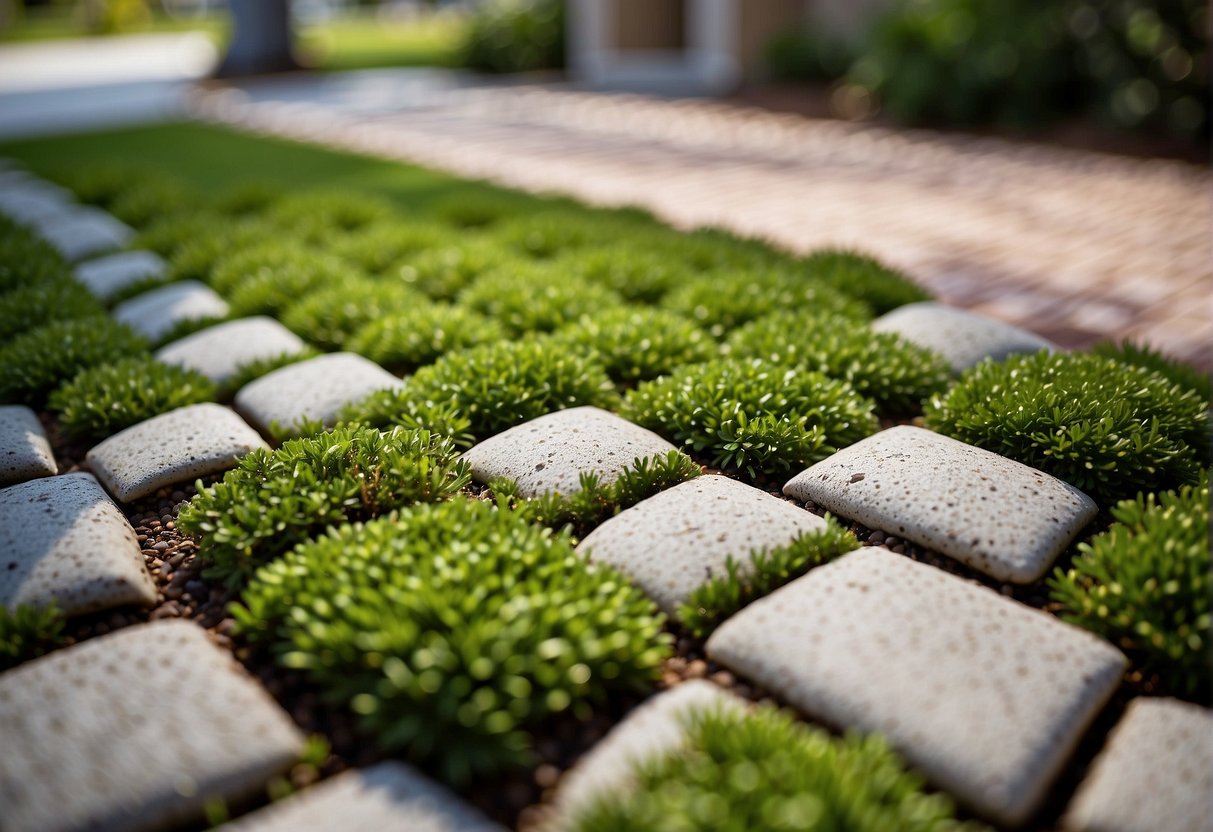
Permeable pavers offer versatile and sustainable solutions for various outdoor spaces, combining aesthetics with functionality to manage stormwater effectively.
Landscaping with Permeable Pavers
In our landscape designs, we often incorporate permeable pavers to create beautiful and eco-friendly spaces. Our selection of paving options supports garden design that requires less maintenance and provides natural water filtration. We typically use them in:
- Gardens: Aligning pathways or defining spaces
- Patios: Enhancing aesthetics with patterns and colors
Permeable Pavements for Driveways and Patios
Our driveways and patios are built with permeable pavers to ensure durability and eco-consciousness. They allow for rainwater to seep through, reducing runoff and replenishing groundwater. Key points include:
- Material Choice: Utilizing high-strength materials suitable for vehicular traffic
- Installation: Ensuring proper base and edge restraints for long-lasting performance
Utilizing Permeable Paving in Parking Lots
We’ve found that permeable pavers are ideal for parking lots, as they mitigate stormwater while withstanding the demands of heavy, repeated use. With our approach, we:
- Plan for Traffic: Design parking lots to handle the specific traffic load
- Prioritize Safety: Ensure a non-slip surface and clear markings
Sidewalks and Walkways Construction
Our approach to building sidewalks and walkways centers on safety, accessibility, and environmental responsibility. By using permeable pavers, we ensure:
- Accessibility: Compliant with regulations for width and slope
- Integration: Seamlessly connecting with the landscape’s overall design
Material Aspects and Design Considerations
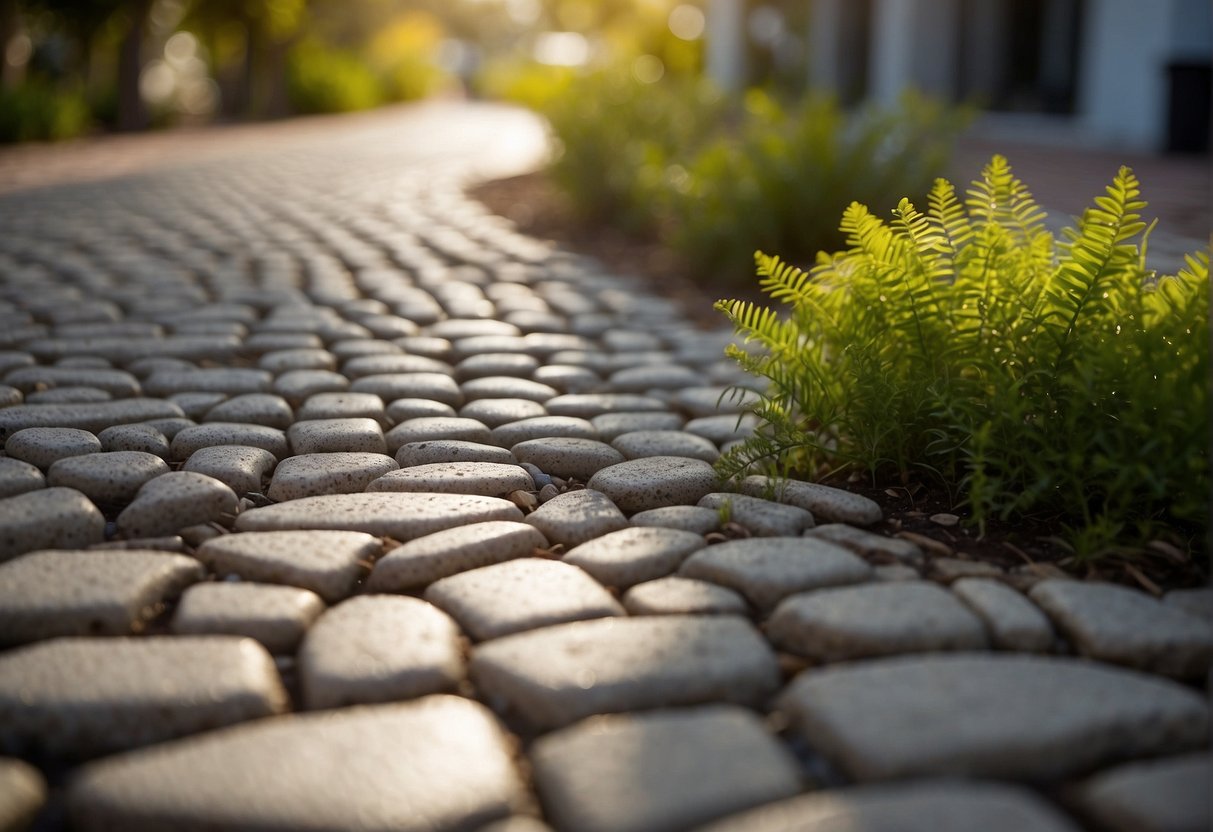
In this section, we discuss the specific materials and design strategies that optimize permeability and sustainability in permeable pavers in Fort Myers.
Types of Permeable Paving Materials
Permeable paving materials allow water to filter through the surface, reducing runoff and improving groundwater quality. Gravel is a common choice, offering easy installation and natural filtration. Porous concrete, a mixture of concrete and a permeable aggregate, is also widely used. This material allows water to pass while maintaining structural integrity.
Natural stone options, such as granitecrete, combine granite aggregate with a binding agent, providing a durable and aesthetically pleasing surface. Turfstone pavers, which integrate grass or groundcover, offer an ecological solution that blends seamlessly with the environment. We prioritize materials like these for their permeability and environmental benefits.
Paving Design for Optimal Permeability
When designing permeable paving systems, we aim for the highest level of permeability without compromising stability. Our designs often feature gaps between pavers filled with small stones or grass, allowing for efficient water infiltration. The patterns in which the pavers are laid can also enhance permeability; for example, herringbone or staggered joint patterns can facilitate better water flow than linear arrangements.
By combining various materials such as recycled granite or recyclable plastic grids, we achieve a balance between strength and eco-friendliness. We closely assess site-specific conditions such as soil type, slope, and expected rainfall to tailor our paving solutions.
Sustainability in Manufacturing and Materials
Sustainability is central to our selection of materials and manufacturing techniques for permeable pavers. We strongly advocate for the use of recycled materials, like crushed concrete or recycled plastic, which reduce waste and decrease demand on natural resources. Pervious concrete and other eco-friendly materials are crafted to lower our carbon footprint during production.
Furthermore, we actively source materials locally whenever possible, shrinking transportation emissions and supporting the local economy. The use of sustainable natural stone and biodegradable materials like turfstone reflects our commitment to environmental stewardship without sacrificing performance or aesthetic quality.
Installation and Maintenance of Permeable Pavers
In ensuring the longevity and effectiveness of permeable pavers, we prioritize professional installation and regular maintenance. Understanding the procedures and necessary care helps these systems serve their eco-friendly purpose in Fort Myers.
Professional Installation Practices
We begin the installation process with a comprehensive site assessment to ensure proper drainage and load-bearing capacity. A layered system forms the foundation: a sub-base of crushed aggregate, a base layer, and finally, the permeable pavers. It is critical to adhere to manufacturer specifications for the spacing of pavers to allow for optimal water infiltration.
Key Installation Steps:
- Site assessment and planning
- Sub-base of crushed stone, graded for permeability
- Base layer installation, typically of smaller aggregate
- Placement of permeable pavers with precise spacing
- Filling joints with the appropriate aggregate for water flow
Long-Term Durability and Care
Our experience shows that with correct installation, permeable pavers boast impressive durability against Fort Myers’ climate. To maintain their permeability, regular cleaning is essential. This typically involves removing debris from the surface and occasionally vacuuming the joints to prevent clogging.
Maintenance Tips:
- Regular Cleaning: Sweep off leaves and debris.
- Vacuuming Joints: Remove any build-up to maintain porosity.
- Inspection: Regularly check for and address any shifting or damage.
Dealing with Oil and Chemical Spills
In the event of oil or chemical spills on the permeable pavers, immediate action minimizes environmental impact and paver damage. We recommend using an environmentally-friendly cleaner specifically designed for permeable surfaces to break down the contaminants without harming the surrounding area.
For Oil and Chemical Spill Response:
- Contain the spill promptly.
- Apply an eco-friendly cleaner suitable for permeable pavers.
- Rinse carefully, ensuring no harmful chemicals enter the drainage system.
Cost-Effectiveness and Incentives
When discussing permeable pavers in Fort Myers, it’s essential to consider both the initial investment and the potential for long-term financial benefits. Moreover, municipalities often provide tax incentives and rebates to encourage eco-friendly practices.
Initial Costs vs. Long-Term Savings
Permeable pavers typically have a higher upfront cost than traditional paving materials. The specialized materials and installation methods can increase initial expenses. However, we must consider the long-term savings associated with permeable pavers. They reduce the need for expensive drainage systems and mitigate flood damage costs. Furthermore, because permeable pavers are durable and require less maintenance, we save money over the long haul on repairs and replacements.
Long-Term Savings:
- Reduced drainage system costs: precipitation filters through the pavers, lessening the burden on sewer systems.
- Low maintenance: less frequent replacements and repairs due to durability.
- Flood mitigation: reduces potential costs from flood damage.
Municipal Tax Incentives and Rebates
Municipalities in Fort Myers often offer tax incentives and rebates to property owners who install eco-friendly features like permeable pavers. These programs aim to promote sustainable development practices by making them more cost-effective for residents and businesses. The specific incentives can vary, but they typically include reductions in property taxes or direct rebates after installation. By taking advantage of these financial incentives, the initial cost of permeable pavement projects can be significantly offset.
Municipal Incentives:
- Property tax reductions: for implementing sustainable features.
- Direct rebates: post-installation incentives to aid with upfront costs.
We encourage property owners to research local programs to fully benefit from these incentives, as they not only aid in upfront affordability but also emphasize the long-term economic and environmental value of permeable pavers.
Additional Advantages of Permeable Pavers
Permeable pavers offer a myriad of benefits that extend beyond water management. Our focus in this section is to elucidate how these paving solutions contribute to improved safety, environmental sustainability, and urban comfort.
Enhancing Safety and Aesthetics
Safety is paramount in any urban design, and permeable pavers play a critical role in ensuring that. Their porous nature significantly reduces water accumulation, which, in turn, minimizes the risk of slip hazards. The texture of these pavers also contributes to a more secure footing, helping to prevent falls and injuries.
- Aesthetics: Permeable pavers come in a variety of styles and colors, making them versatile for blending into historical contexts or enhancing modern designs.
Reducing Carbon Footprint and Fostering Eco-Conscious Choices
Permeable pavers contribute to the reduction of carbon footprint by allowing for the natural replenishment of groundwater. This translates to less reliance on stormwater systems which typically involve energy-intensive processes. By choosing permeable pavers, we’re making eco-conscious choices that align with green building standards.
- Materials: They often consist of recycled materials, further diminishing the environmental impact.
- Heat Island Effect: These pavers are often lighter in color and absorb less heat, minimizing urban heat islands.
Storm Drains Relief and Heat Reduction
The installation of permeable pavers eases the burden on storm drains by allowing rainwater to percolate through the ground. This natural filtration can reduce the risk of flooding and erosion, protecting local waterways from the influx of pollutants.
- Reduced Heat: Surfaces with high permeability also tend to have lower surface temperatures, thus contributing to a reduction in ambient heat and creating a cooler urban environment.
Frequently Asked Questions
Permeable pavers are a sustainable hardscape option that offers environmental benefits, including water management and heat reduction. We’ve compiled some common questions to further explain their advantages.
What benefits do permeable pavers provide in terms of water management?
Permeable pavers allow water to filter through the surface, reducing runoff and promoting natural groundwater recharge. This system mitigates the impact of heavy rainfalls and lessens the burden on local drainage systems.
How do permeable pavers contribute to reducing urban heat islands?
Traditional pavement can absorb and retain heat, contributing to higher temperatures in urban areas. In contrast, permeable pavers have a more open structure that helps to cool the environment by allowing water to evaporate, thus lowering the surface temperature.
In what ways do permeable pavers support local ecosystems?
By allowing water to infiltrate into the ground, permeable pavers help nourish vegetation and support biodiverse habitats. Moreover, the replenishment of groundwater can benefit local trees and plants, contributing to a healthier ecosystem.
Can permeable pavers help mitigate flooding, and if so, how?
Yes, permeable pavers can reduce the risk of flooding by capturing and slowly releasing stormwater into the soil, instead of allowing it to flow unimpeded into streets and storm drains where it can cause flooding and pollution problems.
What maintenance considerations exist for permeable pavement systems?
Maintenance for permeable pavement typically involves regular sweeping to remove debris and occasional vacuuming to prevent the pores from clogging. In some cases, the top layer of aggregate may need replenishment to maintain permeability.
How do permeable pavers compare to traditional pavement regarding lifecycle and sustainability?
Permeable pavers tend to have a longer lifecycle and require fewer resources for repair and replacement compared to traditional pavement. They also contribute to sustainability by reducing the need for extensive drainage systems and by minimizing the heat island effect.
